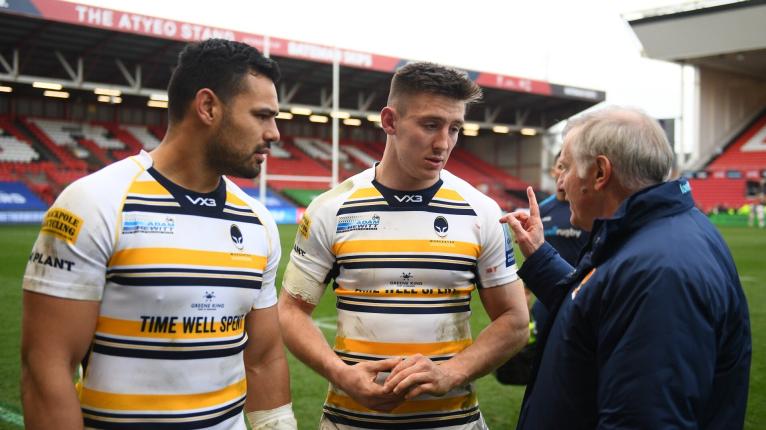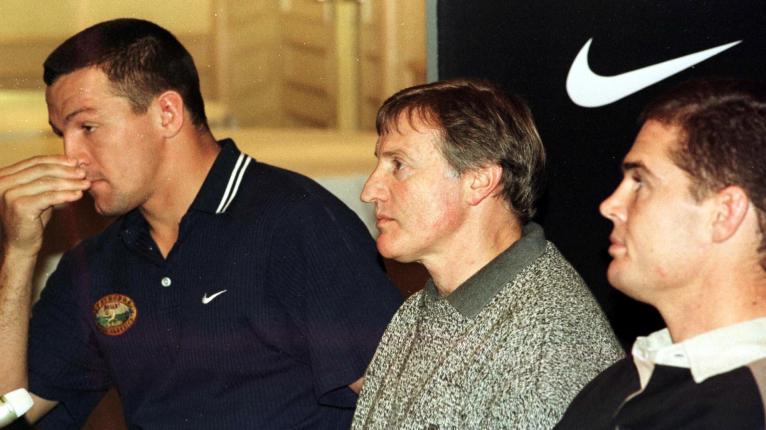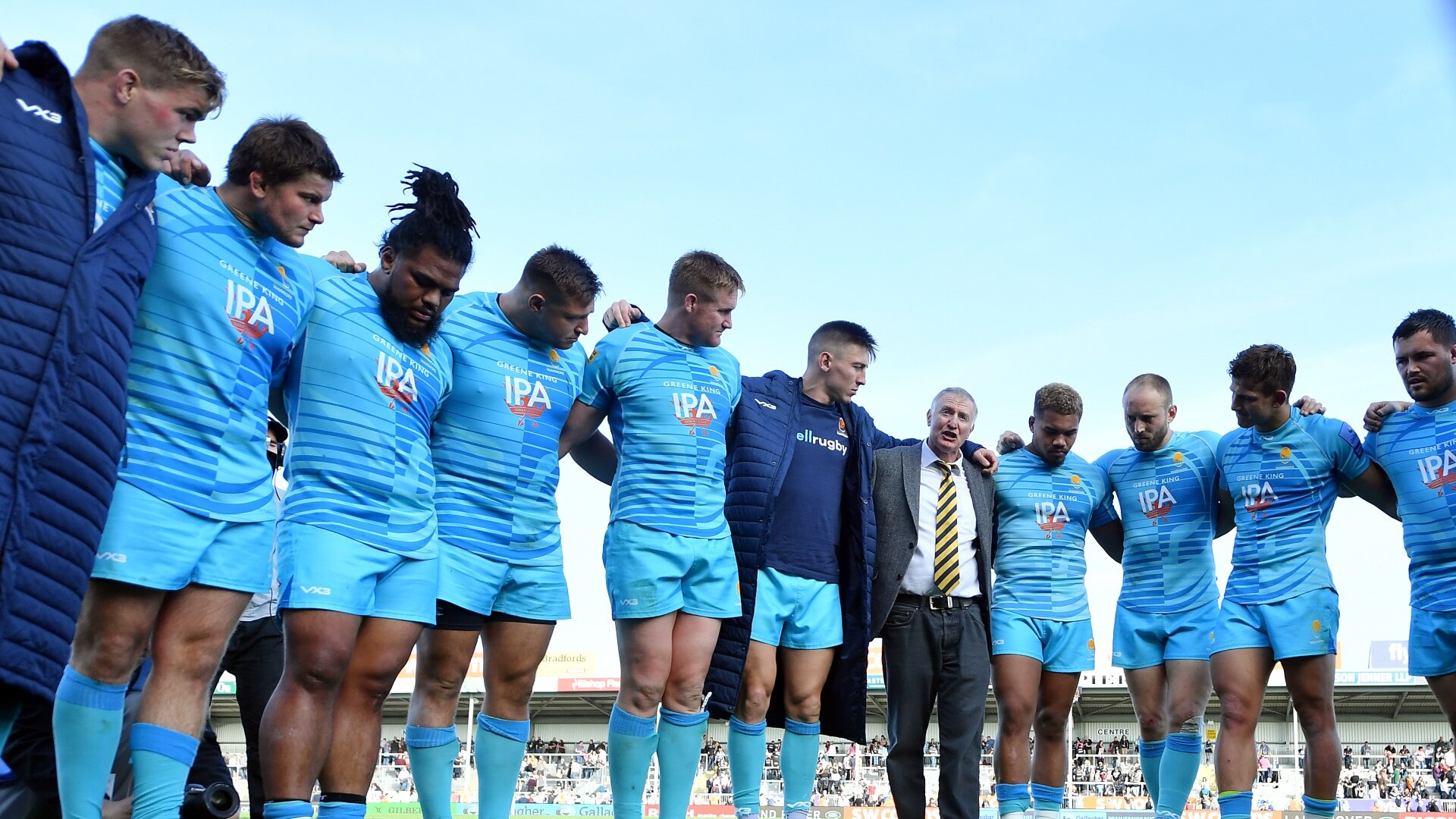Elite coaching is increasingly no country for old men, but 68-year-old Alan Solomons is bucking that trend

It’s been quite the weekend in the Premiership relegation battle. Before a ball was kicked, you had the three bottom sides clustered together. Just three points separated 12th from 11th and just five points separated 12th and 10th who were playing each other.
Come close of business and a situation anticipated to go to the May 18 wire now has much more clarity. Newcastle, beaten by Leicester in a Friday night thriller, trail Tigers by eight points with three matches remaining.
Nearly just as worse for Falcons, the sandwiched Worcester are now seven points clear of the trapdoor following their 37-17 schooling of play-off chasing Sale. They’re looking very good for a survival that will vindicate their faith in a South African who is just 15 months shy of his 70th birthday.
Alan Solomons’ lengthy coaching career appeared over when he stepped away at Edinburgh in September 2016 just a few weeks into the season. Rugby coaching is increasingly becoming no country for old men but rather than retire to the pipe and slippers by the fireside at his Helen’s Bay bolthole in Northern Ireland, the soon-to-be septuagenarian refused to go quietly.
By the following February, he was back on the beat, temporarily helping at Bristol as a consultant. Eight months later he parachuted into Worcester as assistant. Then, within two months, he took charge of the whole shooting match, appointed director of rugby until summer 2020 following Gary Gold’s exit to America.
(Continue reading below…)
https://www.facebook.com/rugbypass/videos/2302806356663432/
For Solomons, it was a victory for a CV as long as his arm. There was some bemusement that southern hemisphere experience was favoured over potentially accommodating a bright young English coach making his way in a tracksuit, but Warriors supporters couldn’t give two hoots about an age which marks Solomons out as the oldest boss in the European game at the 40 Premiership, PRO14 and Top 14 clubs.
Some of the age gaps are stark. At 68, he checks in a whopping 29 years older than fellow countryman Johann van Grann at Munster. Even in the relegation battle, he has 28 years on Leicester rival Geordan Murphy. That’s quite a gulf.

Of the 42 coaches running the clubs (two clubs, Racing and Grenoble, have joint coaching tickets), just three – seven per cent are aged 60 or over, an exclusive age bracket compared to the ages of 47 and 51 where 17 of the coaches – 40 per cent – can be found, the likes of Saracens’ Mark McCall, Bristol’s Pat Lam, Edinburgh’s Richard Cockerill and Exeter’s Rob Baxter.
Not that Solomons – who turns 69 in July – is in the Premiership record books as the oldest ever old stager. Alan Gaffney was 71 when interim director of rugby this time last season at Northampton. Just like the Australian, the dignified and calm way the South African keeps himself relevant in a younger coach’s game is intriguing.
NO COUNTRY FOR OLD MEN… EUROPEAN RUGBY’S CLUB COACHING ELITE
68 YEARS OLD – Alan Solomons (Worcester); 66 – Christian Lanta (Perpignan); 60 – Chris Boyd (Northampton);
57 – Wayne Pivac (Scarlets), Kieran Crowley (Treviso), Vern Cotter (Montpellier), Philippe Sella (Agen); 56 – Michael Bradley (Zebre); 55 – Dean Richards (Newcastle), Dave Rennie (Glasgow); 53 – Christophe Urios (Castres); 52 – John Mulvihill (Cardiff);
51 – Mark McCall (Saracens), Steve Diamond (Sale), Dai Young (Wasps), Allen Clarke (Ospreys), Heyneke Meyer (Stade), Deon Davids (Kings); 50 – Pat Lam (Bristol), Laurent Travers (Racing), Laurent Labit (Racing); 49 – Andy Friend (Connacht – 50 on April 24);
ADVERTISEMENT48 – Rob Baxter (Exeter), Richard Cockerill (Edinburgh), Franck Azema (Clermont); 47 – David Humphreys (Gloucester), Todd Blackadder (Bath), Dan McFarland (Ulster), Simon Mannix (Pau); 46 – Franco Smith (Cheetahs);
45 – Ugo Mola (Toulouse), Stephane Glas (Grenoble); 44 – Patrice Collazo (Toulon); 43- Paul Gustard (Harlequins); 42 – Pierre Mignoni (Lyon), Jono Gibbes (La Rochelle); 41 – Leo Cullen (Leinster), Ceri Jones (Dragons), Joe Worsley (Bordeaux); 40 – Geordan Murphy (Leicester – 41 on April 19); 39 – Johann van Grann (Munster); 38 – Dewald Senekal (Grenoble).
Young men are a different breed nowadays compared to those coming through 10 to 15 years ago, but Solomons has evolved and kept on the same wavelength despite some staggering age gaps.
Take Ted Hill, the 20-year-old Worcester back row who has enjoyed a meteoric rise this term. His impact at the Warriors was so impressive that Eddie Jones handed him a November Test debut with England.
Solomons was coaching as a 49-year-old assistant with the unbeaten record-setting Springboks in 1999 when Hill was born, but the wisdom now passing down through the generations isn’t lost on a youngster absorbing every nuance like a sponge.
“He has got bags and bags of experience, just a real good understanding of the game,” enthused Hill to RugbyPass. “He knows what it takes. The game’s changing and has changed a lot in that 15, 20-year time period but he always managed to stay in it.
? – A vital bonus-point win for @WorcsWarriors
?? – Daylight now between the hosts and @FalconsRugby
? – A hat-trick for @JoshAdams951Full report from a dreamy day at Sixways ?https://t.co/702AZ6E3gf pic.twitter.com/8WyVkYhlBv
— Premiership Rugby (@premrugby) April 13, 2019
“If you know the basics there will always be a place and Alan Solomons has been around the block. He knows the craic. One of his major bits of advice is to be consistent in your game. He always says if perform one week and not the next, you can very quickly get a reputation of being flaky and inconsistent.”
Fellow forward Jack Singleton, the 22-year-old hooker linked to an end-of-season switch to Saracens, is also taken in by how the elderly Solomons taps into the culture of youth. “Solly engages fantastically with the younger lads,” he said.
“Times have changed but a lot of rugby still has its core values and a lot of stuff he represents fantastically and gets across to the players really well. I don’t think anyone has ever had any issues communicating with Solly. He has been fantastic, showed a lot of faith in me and I’m very grateful for that.”
? "There's nothing like playing at your home ground when the crowd is right behind you."
Solly praises the atmosphere at Sixways and gives his verdict on today's win… pic.twitter.com/3eA7WVeYgr
— Worcester Warriors (@WorcsWarriors) April 13, 2019
It was 1997 when Solomons quit law to pursue full-time coaching, an odyssey that has seen him coach the Stormers, Southern Kings, Western Province, Eastern Province and the Boks at home, while his list of European suitors include Ulster, Northampton, Edinburgh and Worcester.
Not until he first walked in the Sixways door 18 months ago did 31-year-old GJ van Velze first meet his fellow South African. Digging what the youngsters are about is something Solomons has reacted to.
“We have noticed how much information youngsters can take in per sitting and adapted a few things. But yeah, he works well with them. He’s an extremely honest guy which at times could feel tough but in hindsight, as a youngster that is all you need.

“You need honesty. It gives you clear direction on what to work on and what not to work on. As a youngster I would have loved to be under him so I would know exactly where I would stand in terms of a pecking order or skills I’d need to work on or what are my positives and my negatives are.
“He has reminded me of a few things that I had not forgotten but not paid enough attention on. The importance of controlling a game, those type of things. As a rugby player you have to evolve every season. If you don’t add anything to your game you could find yourself stagnating and before you know it you’d be off the team and a better version of yourself is taking your place. There is a balancing act between keeping you on your toes and constantly evolving.
“Yes, the technology has changed. Yes, athletes are bigger, faster, stronger and quicker. The game is quicker, the ball in play is longer, but the fundamentals of the game have stayed the same and that is why you still have room for very mature coaches.”





























